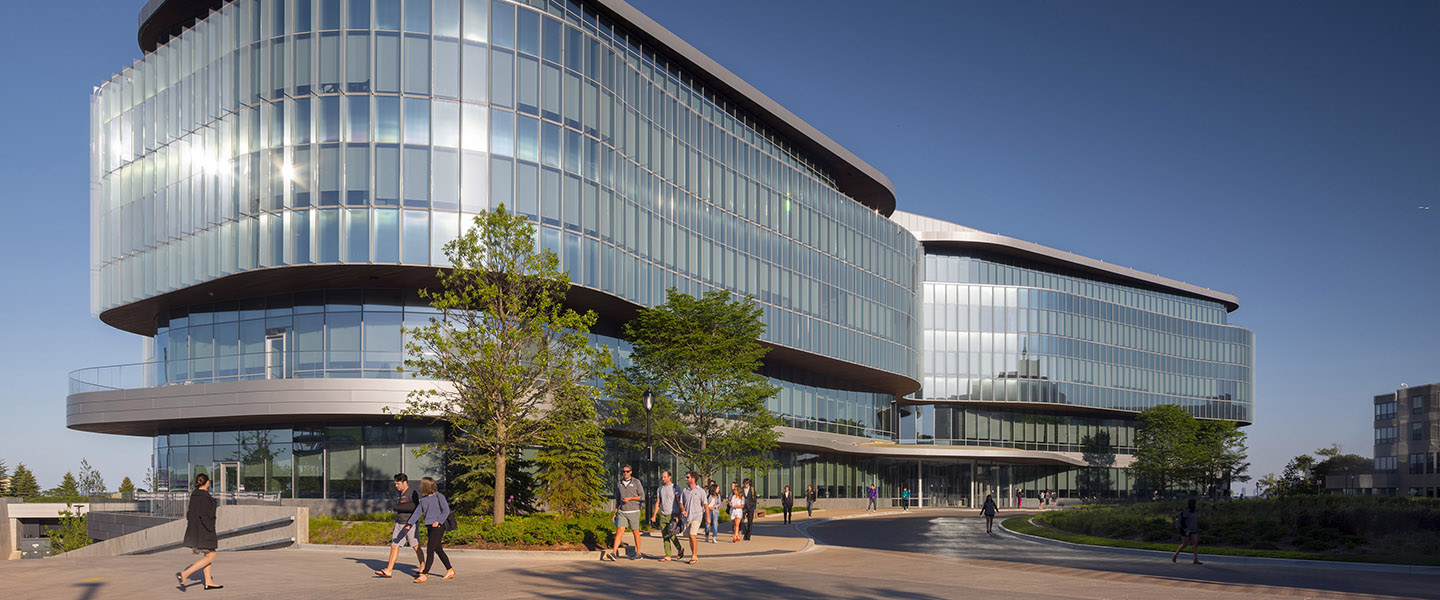
Kellogg Global Hub Achieves LEED Platinum Status
The Kellogg School of Management’s Global Hub has been awarded Leadership in Energy and Environmental Design (LEED) Platinum certification, joining Kresge Centennial Hall as a Northwestern University building to earn the U.S. Green Building Council’s highest green building rating.
Opened in March 2017, the Global Hub is the first newly constructed building to earn platinum status and the 12th University building to be LEED certified between the Evanston and Chicago Campuses.
It also is Northwestern’s largest LEED-certified building at 415,000 square feet.
“Achieving LEED Platinum certification for the Global Hub underscores Kellogg’s strong commitment to sustainability,” Kellogg Chief Operating Officer William Garrett said. “A world-class facility demands world-class practices, and the Global Hub checks all of the boxes: it minimizes its carbon footprint, is comfortable and healthy for its occupants and encourages collaboration and a sense of community.”
A marvel of modern architecture, the Global Hub is the latest example of Northwestern’s commitment to sustainability. All new construction projects must achieve LEED Gold certification, while major renovations must earn at least LEED Silver under the University’s Strategic Sustainability Plan (2017-2021).
The University has reduced its energy-use intensity by 11 percent since 2010 by pursuing best practices for buildings such as earning LEED certification.
Toward that end, the Global Hub taps into a geothermal energy system underneath an adjacent football practice field for efficient heating and cooling, and it uses LED lighting in nearly 6,000 fixtures throughout the facility.
“Kellogg and the Weinberg College of Arts and Sciences have formed a transformative collaboration by combining business and economics in ways that lead to new research and attract the top students in the world,” said John D’Angelo, vice president for facilities. “The Global Hub embodies that transformative collaboration by providing teaching, learning and engagement opportunities for Northwestern students, faculty and researchers in a space that is beautiful, functional and resource efficient.”
Home to Kellogg and the Weinberg College of Arts and Science’s economics department, the Global Hub performed particularly well in two of LEED’s five categories: sustainable sites and water efficiency.
For the former, the Global Hub earned 23 of 26 possible points because its location offers occupants easy access to multiple forms of sustainable transportation. Occupants are close to public transportation and the Northwestern Shuttle, and the Global Hub provides bike racks, showers and changing rooms for cyclists.
The Global Hub also features low-flow plumbing fixtures in restrooms and kitchens, reducing water consumption by 40 percent. Its landscaping is designed for efficient irrigation and contains adapted plants that require minimal watering. Together, those features earned the Global Hub 8 of 10 possible points for the water efficiency category.
In all, the Global Hub earned 85 points on LEED’s 110-point scale (80 points are required for Platinum). The building achieved 26 of 35 points for energy and atmosphere, 7 of 14 points for materials and resources, 11 of 15 points for indoor environmental quality and 10 of 10 points combined for the design process and regional priority categories.
“We are proud to have successfully integrated best-in-class sustainability with a stunning architectural design, proving that excellence in design and sustainability are not mutually exclusive,” said Bonnie Humphrey, director of design for facilities.
Other notable sustainable features or construction practices for the Global Hub include:
- Nearly 80 percent of waste generated during construction was diverted from landfills through recycling or reuse
- The construction team used low-emitting paints, adhesives, sealants and other materials for better indoor air quality
- An advanced ventilation system circulates fresh air throughout the building
- Triple-glazed windows keep spaces cool in the summer and warm in the winter, lowering energy consumption
- Automated shades respond to heat of the sun on hot days, saving on cooling costs
- Daylight sensors minimize the need for artificial lighting indoors
The U.S. Green Building Council is a nonprofit with a mission to “transform the way buildings and communities are designed, built and operated, enabling an environmentally and socially responsible, healthy and prosperous environment that improves the quality of life.” More information on LEED is available on the organization’s website.